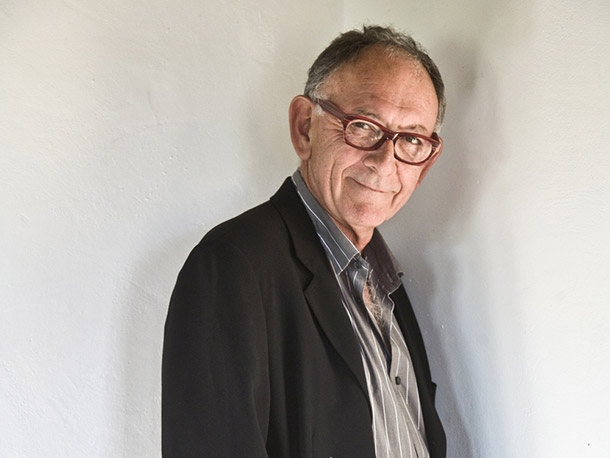Like a real-life Indiana Jones, wine importer Kermit Lynch fearlessly descends into caves and cellars in search of treasure — only the gems that Lynch seeks can be enjoyed in a glass. This Indy, however, comes with a twist of Renaissance man: Not only is the personable Lynch a legend in the wine world, he is a musician, author and a bit of an iconoclast. Although he shies away from describing himself as a rebel — at least “not at a champion level,” he demurs — Lynch certainly isn’t afraid to do things differently and to take chances.
Lynch has risen to prominence in the wine world despite beginnings that were at times humble and freewheeling. The two-time James Beard-award winner and recipient of the French government’s prestigious “Legion d’Honneur” was raised in San Luis Obispo, California, by a strict fundamentalist preacher and a fun-loving mother. Neighbors introduced him to what would become two of his biggest passions — music and wine — as they regularly enjoyed both with dinner.
“That was part of their life,” Lynch says. “They were European that way, even though they weren’t European.” After a move to Berkeley in 1962 and a failed attempt to make it as a musician, Lynch used the money he’d made from selling handbags made out of Oriental rug scraps to “bum around Europe for four months.” There, he was struck by the centuries-old traditions of wine, cuisine and community in French and Italian culture. Upon his return to the States, he hoped to find a job in a wine business to support himself while he continued to pursue music. But with an economic recession in full swing, companies weren’t hiring. He reached the point, Lynch says, where “I couldn’t even afford a harmonica.”
Lynch’s girlfriend at the time suggested that he open a wine shop to make some money. Armed with a $5,000 loan from his girlfriend, Lynch opened the doors to his Berkeley wine shop in 1972, with cases of wine stacked on the floor — a display method he still employs today. “I think my hope was that it would encourage people to feel like they should buy the whole case,” he says.
Lynch became known for drawing attention to small, artisanal producers. He initially sold a variety of wines, and later, despite his shop’s proximity to Napa vineyards, chose to limit his store’s offerings to French and Italian wines — but not because he believed California wines are inferior.
“It’s not that I don’t like California wines,” he says. Rather, he based his decision on two factors: his attraction to the wine culture in France and Italy, with “people sitting down together, eating together, enjoying the wine,” and his dislike of a Pinot Noir his close friend and California winemaker Joe Swan had created. “I couldn’t buy it for my store,” Lynch says, but he didn’t want Swan to feel insulted. Specializing in French and Italian wines provided a neat solution. Over time, though, Lynch noticed that wines he’d tasted in the cellars of European winemakers did not always taste the same upon their arrival in the States.
“I’d go to wineries [in France and Italy],” Lynch says, “go down in the cellar, and knew what it tasted like there — usually it was coming right out of the barrel. But sometimes when it arrived after being shipped, I’d think, ‘It’s not the same. It’s not as good as it was in the cellar.’ And I wondered why.”
He learned that wines were shipped in metal containers that left them vulnerable to heat exposure, particularly as they traveled through the Caribbean en route to the west coast of the U.S. Lynch remedied the problem by pioneering the use of refrigerated shipping containers. He worried, however, that importers who shipped in metal containers and sold the same wines that he did would inadvertently engender bad reviews of the wines. And so, Lynch decided to become an exclusive national distributor.
“I realized I had to have exclusivity, to control the market,” Lynch says. “If I have it and it’s good and someone else sells it and it’s cooked, that doesn’t reflect well on my product.” In 1998, with a wife and family and a heavy travel schedule that had him crisscrossing continents on a regular basis, Lynch became co-owner, along with the Brunier brothers of Domaine du Vieux Télégraphe, of Domaine Les Pallières in Gigondas, a 60-acre estate located in France’s Southern Rhone region. Though he says he didn’t want to be a winemaker, he found the site to be ideal, enabling him to take longer, less frequent trips to Europe. Lynch and the Bruniers revitalized the property, making many upgrades.
Today, the estate’s upper and lower terraces are vinified separately to allow for better expression of each terrace’s personality. Domaine Les Pallieres Gigondas Terrasses du Diable showcases the great structure and intense minerality of the higher-altitude area, with a mix of cherry, blackberry and plum flavors accented with spice, while the Domaine Les Pallieres Gigondas Red Les Racines features the estate’s oldest vines, located in the lower- elevation parcel. Velvety Les Racines has juicy notes of plum, cherry and blackberry with a hint of licorice.
Lynch favors authenticity and old-school winemaking over newer technological methods, such as using additives to block acidity. “I don’t get the technology,” he says. “I’d rather not be in the chemistry lab; I’d rather be in the [wine] caves, meeting the people.” He fears, however, that the gap between artisanal and technological wines will grow as science marches on. Although Lynch emphasizes that terroir matters, his advice to consumers choosing a wine is simple: “They should just find a wine they like,” he says. He also warns against being overly swayed by price or a single factor, such as a wine’s body, as an indicator of quality.
“Everyone has their own taste,” he says. “I believe that. I sincerely do. Everybody’s palate is different. That’s the way we were built. Find out what you think tastes good.” As for what he looks for: “I don’t consider myself a hedonist,” Lynch says, “but the word that comes to mind is ‘pleasure.’ It [should be] an aesthetic pleasure. The way it looks, the way it smells, the aftertaste — all the different aspects. It’s about beauty.”
Lynch much prefers to describe wine in human terms rather than in typical tasting- note language, and is pleased that today, consumers can choose from a huge variety of wines. “Now it’s from all over the world, from places no one’s ever heard of,” he says. “And that’s all good.” But you can hear the surprise in his voice as he reflects on the course his career has taken. “I didn’t get into it as a business,” he says. “I never imagined (my store) would ever be more than a hole in the wall. I had no intent of making this national business.”
Still, it seems he doesn’t want to see it end, as he relishes “the unbelievable contacts and experiences I’ve had. In Europe, I had no idea what to expect — I was a kid from small-town California. But there, in the morning I could be in a cave under someone’s house, tasting wine, and in the afternoon, I could meet the duke- of-something at a different place.”
From Celebrate NH Magazine.


